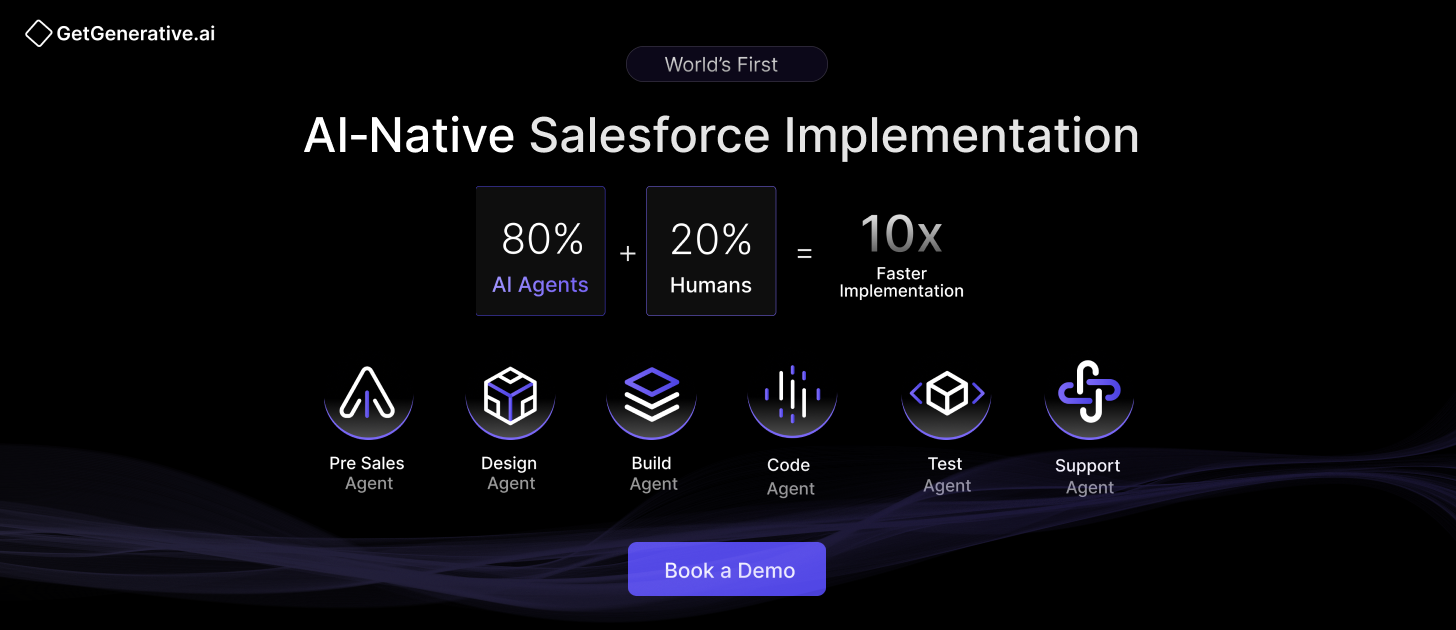What Is a Salesforce Implementation Partner?
A Salesforce Implementation Partner is a consulting firm authorized by Salesforce to help clients design, deploy, customize, and optimize their Salesforce solutions. These firms are certified, vetted, and tiered under the Salesforce Partner Program. Their role is not just technical execution — it’s about aligning Salesforce capabilities with business strategy to unlock long-term value.
Implementation partners are typically:
System integrators or consulting firms with Salesforce-certified professionals
Specialists in Salesforce cloud products (Sales, Service, Marketing, Commerce, etc.)
Experts in configuring, customizing, and integrating Salesforce with other enterprise systems
Why You Need a Salesforce Implementation Partner
1. Expertise You Can’t Build Overnight
Even seasoned IT teams often lack the Salesforce-specific expertise needed to navigate the platform’s full breadth. A certified partner understands:
Which clouds and features to use for your goals
How to avoid over-customization traps
What third-party tools or AppExchange apps can reduce development time
A fast-growing startup might need to migrate data from spreadsheets and automate lead pipelines, while an enterprise may require multi-cloud architecture and legacy ERP integration. In either case, a Salesforce partner delivers tailored guidance and execution.
2. Faster Time to Value and ROI
Implementation partners bring with them:
Proven deployment frameworks
Industry-specific templates and prebuilt components
Deep knowledge of change management and user onboarding
This accelerates go-lives and boosts adoption. According to Salesforce, partner-led projects typically achieve ROI faster and avoid the cost of failed or delayed rollouts.
3. Risk, Cost, and Scope Control
CRM implementations often run into scope creep, budget overruns, and mismatched expectations. Partners mitigate this by:
Defining clear scope boundaries and timelines
Using proven methodologies for estimating and delivering
Advising on best-fit licensing and usage strategies
As highlighted by Salesforce research, bringing a partner in late is one of the top reasons for CRM project failure.
Also Read – Salesforce CRM Implementation With AI – The Ultimate Guide
The Salesforce Partner Ecosystem: By the Numbers
Salesforce’s partner network is one of the largest in the enterprise software world, rivaled only by the hyperscalers.
| Metric | Value |
| Partner Firms Worldwide | ~16,000 |
| Consulting/Service Partners | ~9,000 |
| Certified Salesforce Experts | 73,000+ |
| Salesforce AppExchange Consulting Partners | 2,300+ |
| People Employed by Partners | 6 million+ |
| Net New Revenue from Salesforce Ecosystem (2022–2028) | $2.0 trillion+ |
| New Jobs Expected by 2028 via Ecosystem | 11.6 million |
What Services Do Salesforce Implementation Partners Provide?
Implementation partners offer full-lifecycle services, including:
Strategic Planning & Solution Design
They work with stakeholders to:
Define CRM goals, KPIs, and success metrics
Map business processes to Salesforce architecture
Recommend appropriate clouds, modules, and apps
For example, a manufacturing client might use Sales Cloud for dealer relationships, Service Cloud for equipment maintenance, and Experience Cloud for partner portals — all outlined in the strategy phase.
Configuration & Customization
Partners handle:
CRM setup (objects, workflows, user roles, dashboards)
Automation (flows, triggers, approvals)
Custom code development (e.g., Apex, Lightning Web Components) when needed
They also ensure all customizations align with Salesforce best practices to support scalability and upgrades.
Data Migration & Integration
Salesforce implementations often involve:
Migrating from legacy CRMs (e.g., HubSpot, Dynamics, Zoho)
Cleaning and de-duplicating datasets
Integrating Salesforce with ERP, billing, or marketing platforms
Partners use tools like MuleSoft, Informatica, or native Salesforce APIs to ensure clean, secure data migration.
Testing & Quality Assurance (QA)
Before go-live, partners carry out rigorous QA processes:
System integration testing
Performance and security checks
Bug tracking and resolution via tools like Jira or TestRail
Some partners also leverage automated testing scripts to validate workflows and user journeys, reducing post-launch surprises.
Training & Change Management
A technically sound CRM implementation is useless without user adoption.
Partners support this by:
Conducting admin and end-user training
Creating documentation, user guides, and sandbox walkthroughs
Coaching internal “champions” to drive adoption
Change management isn’t an afterthought — it’s a core deliverable. Top partners create communication plans and feedback loops to boost long-term usage.
Post-Go-Live Support & Optimization
Many implementation partners offer:
Hypercare services during initial rollout
Ongoing managed services (e.g., sandbox refreshes, feature rollouts)
Quarterly business reviews and health checks
Some act as a fractional Salesforce COE (Center of Excellence), ensuring your CRM continues evolving alongside your business.
Also Read – AI-Generated Code: When to Trust It and When to Intervene
How to Choose the Right Salesforce Implementation Partner
Selecting the right partner is as critical as selecting the right technology. Here’s how senior leaders can evaluate options effectively:
1. Match Their Expertise to Your Use Case
Need a multi-cloud rollout? Choose a partner with cross-cloud certifications.
In a regulated sector (e.g., healthcare, government)? Look for industry-specific domain knowledge.
Planning advanced AI use? Ask about Einstein, Data Cloud, or Agentforce experience.
2. Check Credentials and Certifications
Salesforce partners are ranked under the new Partner Navigator framework, with tiers like:
Base
Ridge (formerly Silver/Gold)
Summit (formerly Platinum)
Global Strategic
Also, verify team certifications (e.g., Admin, Developer, Cloud Consultant, Architect). As a rule of thumb, each consultant on your project should hold at least one role-relevant certification.
3. Evaluate Track Record and References
Ask for case studies, video testimonials, or sandbox demos
Review past client success stories, ideally in similar industries
Use AppExchange reviews to gauge satisfaction and delivery consistency
If a partner is reluctant to share references, consider it a red flag.
4. Assess Communication and Cultural Fit
You’re not just hiring a vendor. You’re engaging a long-term collaborator.
Are they proactive and transparent?
Do they ask about your business goals, or just your technical specs?
Are they focused on quick wins or durable outcomes?
Successful partnerships are built on mutual trust and shared goals.
5. Understand the Pricing and Engagement Model
Common engagement models include:
Time & Materials – flexible, great for evolving scope
Fixed Bid – best for well-defined scopes
Packaged Accelerators – quick-start bundles for common use cases
Review service level agreements (SLAs), change request policies, and post-launch support terms carefully.
How to Work Effectively with a Salesforce Implementation Partner
✅ Involve Them Early
Bring partners into strategic planning, not just execution. Let them:
Review your KPIs
Flag risks before they materialize
Shape the roadmap and licensing plan
Early alignment = faster delivery and fewer reworks.
✅ Define Success Metrics Together
Don’t stop at “go live.” Instead, define real-world outcomes:
“Increase lead-to-conversion by 20% in 6 months.”
“Reduce agent onboarding time from 3 weeks to 1”
“Eliminate $X/year in legacy tool costs”
These metrics will help your partner build with business value in mind.
✅ Encourage Knowledge Transfer
Insist on documentation, shadowing, and internal admin enablement.
The goal: your team should be able to maintain and iterate on Salesforce independently, with the partner as a strategic ally, not a permanent dependency.
✅ Use Their Extended Network
Top-tier partners have backchannels into:
Salesforce product managers
Support engineers
ISV and AppExchange partners
Don’t hesitate to ask your partner to escalate tickets, get roadmap previews, or tap prebuilt solutions.
Also Read – The Case for a Unified Orchestration Engine in Salesforce AI Development
Conclusion
Choosing the right Salesforce implementation partner is a crucial step in ensuring the success of your CRM deployment. A skilled partner brings expertise, experience, and a track record of successful implementations, significantly reducing the risk of failure and maximizing your return on investment.
At GetGenerative.ai, we’ve reimagined Salesforce implementation—built from the ground up with AI at the core. This isn’t legacy delivery with AI added on. It’s a faster, smarter, AI-native approach powered by our proprietary platform.
👉 Explore our Salesforce AI consulting services
Frequently Asked Questions (FAQs)
1. Why should I hire a Salesforce implementation partner?
A certified partner brings expertise, experience, and efficiency, ensuring a smooth and successful implementation.
2. How do I choose the right Salesforce implementation partner?
Define your goals, research potential partners, evaluate their approach, check their certifications and experience, and assess cultural fit and value alignment.
3. What are the benefits of working with a Salesforce implementation partner?
Key benefits include access to expert knowledge, customized solutions, reduced downtime, scalability, and ongoing support.
4. What is the typical timeline for a Salesforce implementation?
Timelines vary based on project complexity, but with a partner, it can be completed in as little as a few weeks.
5. How much does it cost to hire a Salesforce implementation partner?
Costs vary depending on the scope and complexity of the project. It’s important to discuss your budget with potential partners to ensure alignment.




